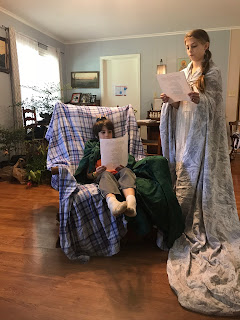A couple of years ago, I read aloud Lamb’s version of King Lear to my kids. When the villain, Edmund, was scheming to hurt people, my 8 year-old son clenched his fists in anger. His eyebrows drew in and his voice grew tense. He hated it!
The story gave him a way to experience for himself an inner knowing that such scheming is bad – in a way that trumped anything I
could have preached to him about the topic.
Likewise, when the good and faithful servant,
Kent, stuck by the king after everyone else had abandoned him, my son set his
jaw and drew up his chest and said, “I want to be like him!”
Isn’t this what education is supposed to do?
· To open our children to seeing what good can look like.· To teach children to love what is worthy of loving.
· To help them recognize those things that are not worthy of our love.
· To teach them to despise the despicable.
The Akathist to the Mother of God, Nurturer of Children puts it this way in Kontakion 10:
“Raise my children to hate sin and all transgression.”
“Raise my children to love good and all virtue.”
No Lesson Plans!
And yet the Shakespeare play still does its work in the heart of the child.
Here’s another example from Julius Caesar, which we were reading aloud together last fall. Honorable Brutus wanted to do what was right, but listened to the wrong voices in his ear. He listened to Cassius, who was trying to manipulate him. Brutus also listened to the fake letters of praise tossed through his window, effectively flattering him, Brutus, you are our only hope!
My children made the connection pretty
quickly:
“Cassius and the letters are like the
demons shooting darts into our minds!”
“The logismoi!”
“Why can’t Brutus see that Cassius is
trying to manipulate him?”
“Brutus is more likely to believe
Cassius because his pride is getting involved!”
That sort of personal revelation is
priceless. The children now have an image in their imagination of what it could
look like to be persuaded to do something against their better judgement. They
have an image of how pride can blind them.
Why do Shakespeare’s plays work like this?
The short answer is, because they are good
art. Good art reveals spiritual truths using material means. Good art expands
our understanding of reality.
One way to know if something is good art is to see if it has stood the test of time. Shakespeare’s plays, written in the 1400’s, have proven themselves in the last 600 years. They don't show us merely what one character is like, or what one place is like. They show what life is like. What human nature is like.
What about this summer?
Perhaps consider approaching a Shakespeare play - either for yourself or with your family.
Next week I will share my strategy for making sure we all understand the play. You might be surprised how much an elementary student can understand of Shakespeare.
Maybe the next time you go to the library, pick up a copy of Lamb's Tales from Shakespeare - or use that link to access a free version you can print or download onto a kindle.
Read with an open mind.
And enjoy the feast!



No comments:
Post a Comment